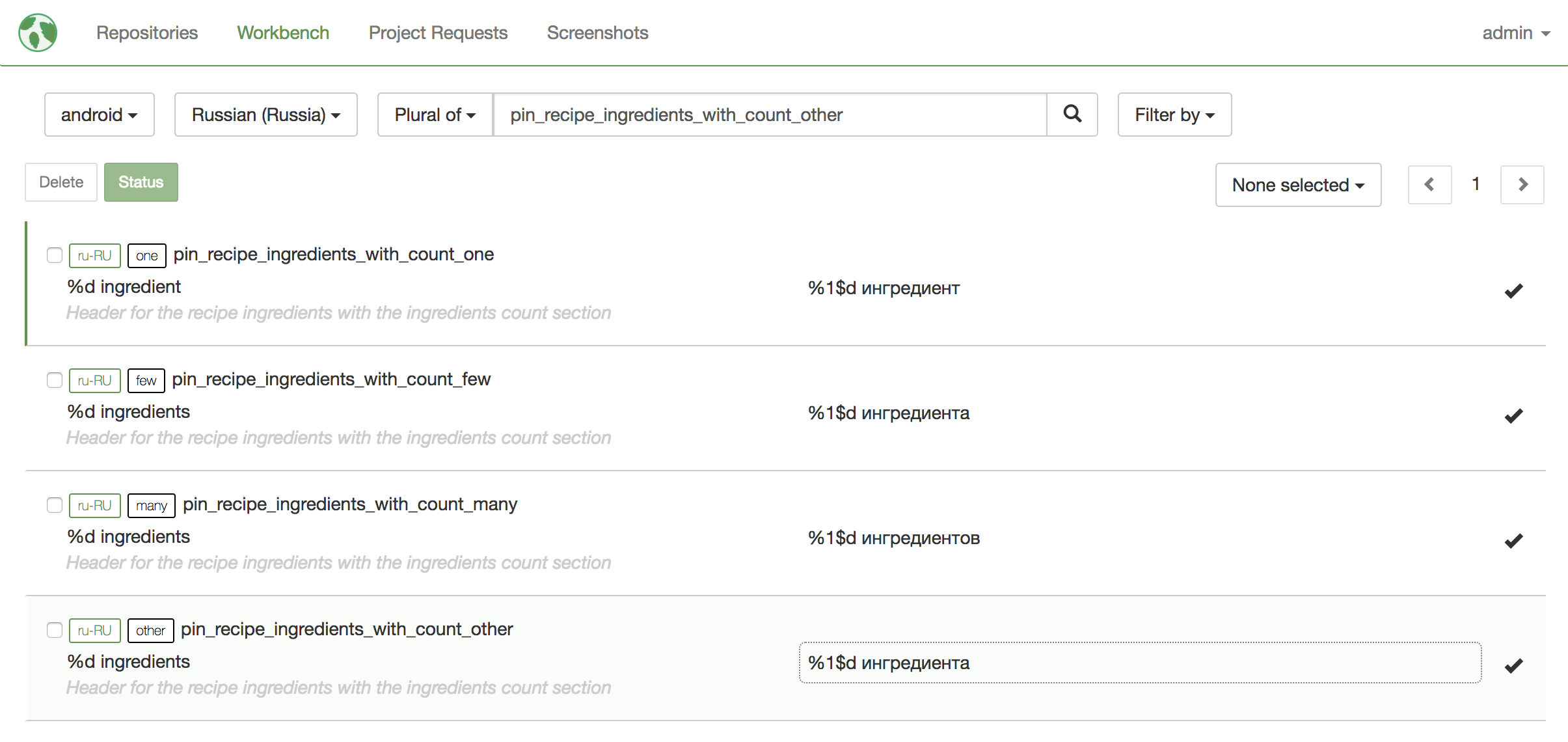Plural Support
Some platforms and file formats provide support for “plurals”. For example, Android
has Quantity Strings
and gettext
allows to store plural translations in PO files that are accessed using ngettext. iOS has the
stringsdict
file type which is dedicated to plural strings.
mojito follows CLDR
standard to manage plurals.
The mapping is straight forward for platforms that also use CLDR like Android.
For gettext, a mapping is required between CLDR forms and gettext indices.
Mojito’s Workbench
In mojito workbench, plural text units are easily identified with the CLDR
form displayed as a label next the locale label. Clicking on the plural label
opens the workbench with all different plural forms.
Depending on the locale, the forms shown are customized. For example, while English has 2 forms (singular and plural), Japanese has a single form and Russian 4 forms.
The 2 forms shown for English in the the workbench:

Single form shown for Japanese:

Four forms shown for Russian:

Android
Corresponding Android resource file (res/values/strings.xml) looks like:
<?xml version="1.0" encoding="utf-8"?>
<resources>
<!-- Header for the recipe ingredients with the ingredients count section -->
<plurals name="pin_recipe_ingredients_with_count">
<item quantity="one">%1$d ingredient</item>
<item quantity="other">%1$d ingredient</item>
</plurals>
</resources>
The Japanese resource file (res/values-ja/strings.xml):
<?xml version="1.0" encoding="utf-8"?>
<resources>
<!-- Header for the recipe ingredients with the ingredients count section -->
<plurals name="pin_recipe_ingredients_with_count">
<item quantity="other">材料:%1$d 種類</item>
</plurals>
</resources>
And the Russian resource file (res/values-ru/strings.xml):
<?xml version="1.0" encoding="utf-8"?>
<resources>
<!-- Header for the recipe ingredients with the ingredients count section -->
<plurals name="pin_recipe_ingredients_with_count">
<item quantity="one">%1$d ингредиент</item>
<item quantity="few">%1$d ингредиента</item>
<item quantity="many">%1$d ингредиентов</item>
<item quantity="other">%1$d ингредиента</item>
</plurals>
</resources>
Gettext
A corresponding Gettext PO file (messages.pot) would look like:
msgid "%1$d ingredient"
msgid_plural "%1$d ingredient"
msgstr[0] ""
msgstr[1] ""
The Japanese PO file (ja/LC_MESSAGES/messages.po):
msgid "%1$d ingredient"
msgid_plural "%1$d ingredient"
msgstr[0] "材料:%1$d 種類"
And the Russian PO file (ru/LC_MESSAGES/messages.po):
msgid "%1$d ingredient"
msgid_plural "%1$d ingredient"
msgstr[0] "%1$d ингредиент"
msgstr[1] "%1$d ингредиента"
msgstr[2] "%1$d ингредиентов"
Stringsdict
The corresponding stringsdict file (Localization.stringsdict) looks like:
<plist version="1.0">
<dict>
<key>%d ingredient(s)</key>
<dict>
<!-- Header for the recipe ingredients with the ingredients count section -->
<key>NSStringLocalizedFormatKey</key>
<string>%#@ingredient@</string>
<key>ingredient</key>
<dict>
<key>NSStringFormatSpecTypeKey</key>
<string>NSStringPluralRuleType</string>
<key>NSStringFormatValueTypeKey</key>
<string>d</string>
<key>one</key>
<string>%d ingredient</string>
<key>other</key>
<string>%d ingredient</string>
</dict>
</dict>
</dict>
</plist>
The Japanese stringsdict file (ja.lproj/Localization.stringsdict):
<plist version="1.0">
<dict>
<key>%d ingredient(s)</key>
<dict>
<!-- Header for the recipe ingredients with the ingredients count section -->
<key>NSStringLocalizedFormatKey</key>
<string>%#@ingredient@</string>
<key>ingredient</key>
<dict>
<key>NSStringFormatSpecTypeKey</key>
<string>NSStringPluralRuleType</string>
<key>NSStringFormatValueTypeKey</key>
<string>d</string>
<key>other</key>
<string>材料:%d 種類</string>
</dict>
</dict>
</dict>
</plist>
And the Russian stringsdict file (ru.lproj/Localization.stringsdict):
<plist version="1.0">
<dict>
<key>%d ingredient(s)</key>
<dict>
<!-- Header for the recipe ingredients with the ingredients count section -->
<key>NSStringLocalizedFormatKey</key>
<string>%#@ingredient@</string>
<key>ingredient</key>
<dict>
<key>NSStringFormatSpecTypeKey</key>
<string>NSStringPluralRuleType</string>
<key>NSStringFormatValueTypeKey</key>
<string>d</string>
<key>one</key>
<string>%d ингредиент</string>
<key>few</key>
<string>%d ингредиента</string>
<key>many</key>
<string>%d ингредиентов</string>
<key>other</key>
<string>%d ингредиента</string>
</dict>
</dict>
</dict>
</plist>
